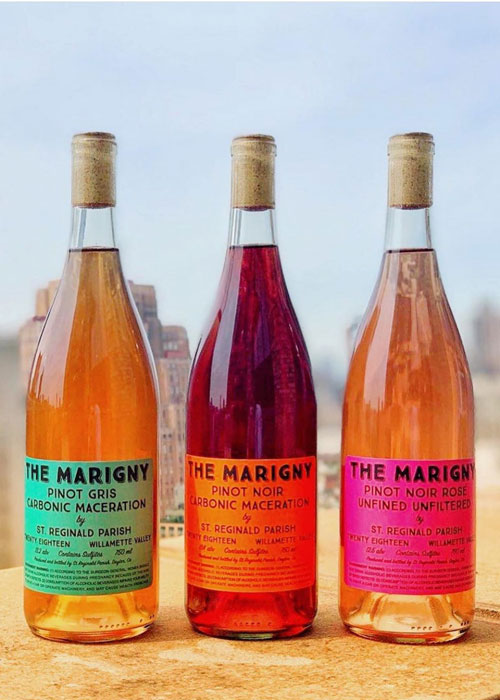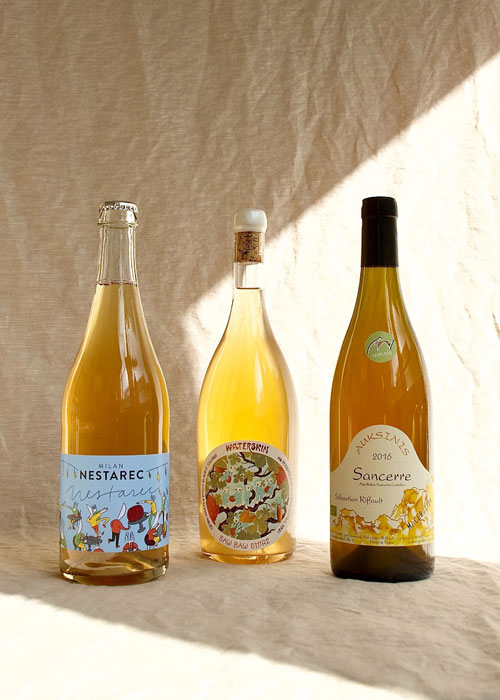Complex, balanced, and thought-provoking are all common — and generally positive — terms used to describe wine. Even words like transcendent and ethereal have found their way into our industry rhetoric, which is a discussion for another time. However, no descriptor has become as frequently used and created such a divide as funky.
Beloved by some and dubbed cringeworthy by many, the notion of “funky wine” has definitely made its mark (and isn’t going anywhere anytime soon). VinePair spoke with seven wine professionals across multiple facets of the industry to hear their thoughts on the term. Turns out, as with most things in wine, the opinions are quite varied.
For the Love of Funk
“Since my first vintage of pét-nat in 2014, it’s always been my aim to make the wines as clean as possible,” says self-taught winemaker and Master of Wine Tim Wildman. He notes that working without sulfur and with wild yeasts can make this challenging, though it’s by no means impossible. Though Wildman enjoys his fair share of funky wines, he admits to having mixed feelings about his wines being described as such, adding that the best thing a buyer or consumer can say about his wines is that they’re clean. “It’s important that a wine stands up and doesn’t have any characteristics that need to be explained or excused,” he says.
But other winemakers feel differently. “I’m completely fine with the term. I’m just happy that people have our wines in their glass,” says Andy Young, winemaker at Willamette-based winery The Marigny. Young feels that it’s not his place to dictate someone’s experience with his wine past making something that he’s proud of, though if consumers refer to his wines as funky, he hopes that it comes from a place of “joy or curiosity.”
When stated in a positive context, Young finds that the term is often used to describe wine in which fruit is not the dominant aromatic characteristic. “I actually don’t see the use of the word funky as inherently bad — it’s just broad,” he says. “If a customer asks for a funky wine, it’s the job of the educator in the shop, restaurant, or winery to help define that request a little more.” Young notes that animal and earthy smells associated with brett, lifted aromatics synonymous with volatility, and nutty flavors of oxidation are often the qualities hiding beneath the word funky’s surface.
Trevor Kellogg of Discovery Wines explains that “funkiness” can embody a broad range of wines, and that, more specifically, the term often encompasses many different characteristics found in natural wines. “If someone were to tell me that they enjoy funky wines, it would mean to me that they are looking for a wine that has been naturally fermented — in particular, wines that undergo a spontaneous fermentation process without selected yeasts or additives, and that are unfined and unfiltered,” he says. Kellogg also highlights that while these traits don’t guarantee a funky wine and that not all natural wines are funky, the term helps point him in the right direction of helping a customer find what they are looking for.
When customers request funky wines, Kellogg generally proceeds to ask questions about grape variety, farming, and regional preferences to further help them along, though at the end of the day it doesn’t bother him when customers or colleagues use the word funky. “I actually think it’s useful, as it’s a signpost for whether a client should pursue a certain range of selections or perhaps avoid the certain range,” he says, noting that the term can help delineate which selections from the store will work best for customers’ needs. “In the end, it comes down to having a meaningful discussion with the customer and knowing our inventory,” he says.
Ryan Tate, partner at Saugerties, N.Y.–based Windmill Wine & Spirits, also finds the word to be subjective. “I use funky to describe wine that tastes different and a bit unconventional, but some use it to describe flavor,” he says. Tate finds that “earthy, musty, barnyard, shroomy, and yeasty” are all flavors that could translate to what his clients are looking for when this word is used. However, the term doesn’t upset him. “If you like the funk, bring on the funk — positive vibes only,” he says. “Like I was once told, the quality of wine is determined in the glass, so to me, that means if you like funk, you like it. Freak the funk forever.”

The Funky Controversy
Young finds that the notion of funkiness has been a “hot-button issue” in the wine community in recent years, namely because it has become a signifier of the natural wine movement. He highlights the commonly misconceived notion that natural wine must be funky (and vice versa) as an educational issue — though one that can simply be solved by tasting more and seeing various flavor profiles that exist under the banner of natural wine. “It’s just about finding a wine that moves you personally,” he says.
In the on-premise sector, Sam Stoppelmoor, wine director and general manager of Compagnie des Vins Surnaturels, finds that the word funky’s use is similar to that of the word interesting. “As with all wine descriptions, funky is in the eye (as well as mouth and nose) of the beholder,” he says. Stoppelmoor adds that, for example, both well-made “earthy” Burgundy and bacterially flawed wine could be described as funky.
This is where Alsace-based vigneron Christian Binner’s explanation comes in. Binner finds that the notion of funky describes two things: aesthetics and flaws (the latter of which are deemed suitable if not preferable by certain consumers). In terms of aesthetics, simple cloudiness and fizziness could commonly be deemed as (albeit harmless) funk, depending on the taster.
“There is pedagogical work to be done to explain this,” he says, revealing that remarks made about simple aesthetics as funkiness are beginning to annoy him. “No one describes cloudy organic apple juice as funky!” he exclaims. The solution? Simply give cloudy and aesthetically different wines a chance and taste them before potentially criticizing or labelling.
Stoppelmoor finds that a touch of funk can add complexity to wine, yet too much could render it flawed. “If a wine I know to be clean is described as funky, I may revisit to make sure the bottles are still in good condition,” he says. “If a classic, de-stemmed, fruit-driven Pinot Noir is described as funky, I may check to see if the bottle is flawed.”

Funky Alternatives
Christina Rasmussen, founder of London-based Littlewine, actually loves the “multifaceted” nature of the word funky, despite finding it a bit overused in wine descriptions — especially in experimental style wines. “I worry that the negative meaning of the word can overshadow the positive,” she says, emphasizing the synonymity between funky and faulty. “Perhaps more effort should be put into the [tasting] note.” If a wine is great but unusual, says Rasmussen, we should figure out why it presents itself as such.
Wildman, who echoes Rasmussen’s point, says that perhaps words like rustic, earthy, and animale could be better used to describe “funky” wines — though he admits that the latter veers into “wine speak” territory, which could be off-putting to some consumers. As alternatives, Stoppelmoor suggests different, unusual, atypical, or earthy. Rasmussen offers avant-garde, experimental, edgy, thought-provoking, or individual. Kellogg prefers the notion of “rawness” to that of funky.
Kellogg notes that at the end of the day, he doesn’t judge customers based on their choices of wine descriptors, despite the fact that some trade professionals feel that the term should be avoided.
Binner sums it up best in citing an old French proverb : “In matters of taste and color, there can be no disputes!”
